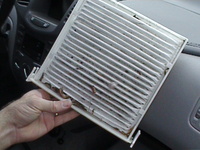Performance Versus Protection: Seeking a Happy Medium in Automotive Air Filtration
GASTONIA, N.C., June 28, 2007 -- If you thought the "great taste/less filling" beer debate got people worked up, go hang around a garage or auto parts store and listen to the arguments over air filtration.
"Performance versus protection" really stirs up the dust.
Air filters do just that: they filter dust and debris from the air before it enters the engine as a key component of combustion. But there is an inherent trade-off between air flow and air filtration.
As an example, one independent study posted online at the engine performance site bobistheoilguy.com, found negligible differences between the NAPAGold(TM) filters' composite media, and K&N Filters(TM) cotton filter. "So a K&N probably does yield some power on higher output race motors where every last ounce of power must be squeezed out. On lower powered street cars, it is probably not much of an improvement over paper," was the conclusion.
At one end of the spectrum is an engine without any filter at all. The engine would have an unrestricted flow of air, but it would also ingest whatever was in the air, which could cause damage.
At the other end would be an engine whose air intake was completely closed off. No dirt would get in, but neither would any air, and the engine would starve.
Since the invention of the internal combustion engine, there has been near-constant attention to the filter medium in an effort to balance performance and protection.
In modern times, the debate comes down to cotton versus paper, with cotton filters billing themselves as the high-performance choice, while paper (which is actually not paper at all, but a composite of materials) is seen as more protective and convenient.
But is that really the case? Not necessarily, according to several tests done recently.
The argument in favor of cotton filters is they let in more air, and thus allow for more power, especially at the top end.
But in fact, composite filters allow as much air as most engines can handle, at any range. Air has to be balanced with fuel in combustion, and excess air is no benefit once the fuel has burned.
On the issue of protection, the results were more pronounced. The NAPAGold composite filter clearly outperformed the K&N cotton filter in terms of filtration. "The 'high performance' cotton gauze and foam filters do not filter as well as some have claimed," was the conclusion. "The stock (composite) type filters perform very well in filtration and don't inhibit air flow nearly as much as some think."
Those results were mirrored in tests performed by Wix Filtration Corp., which manufactures the NAPAGold air filter. In tests on medium-duty diesel pickup trucks, the NAPAGold composite filter captured more than three times the amount of dust than a cotton filter while providing almost identical final efficiency.
But there are other elements to this debate as well: cost and convenience.
Cotton filters must be cleaned periodically in a process that takes several hours and includes spraying the filter with a special cleaner, rinsing the filter, letting it air dry completely, then applying a special oil.
Composite filters, such as NAPAGold Filters, can be changed out in a matter of minutes. The old filter is thrown away and a new one is installed. In a Wix Filtration Corp. study, the cost of buying a new NAPAGold air filter for every change was significantly lower than the cost of buying a K&N filter and the cleaning supplies required to clean and reuse the K&N filter for the same number of changes.
Improper cleaning of cotton filters also affects performance and protection. Even when cleaned, cotton filters are not as effective as when they were new. With composite filters, users get brand-new performance with each filter change.
The cotton versus composite debate will probably never end. But as more tests are done showing that composites have the same performance characteristics as cotton, with much higher rates of protection and with a lower cost/high convenience factor to boot, composite filters such as NAPA Filters will increasingly be the filter of choice.



